BUSINESS LAW TABLE OF CONTENTS
21 Pages7282 Words438 Views
Added on 2020-02-17
About This Document
BUSINESS LAW TABLE OF CONTENTS INTRODUCTION 1 TASK 11 1.1 Legal rules on implied terms regarding sale of goods and supply of services 1 1.2 Statutory provisions on transfer of property and possession 2 1.3 Statuary provisions on buyer's and seller's remedies 2 1.4 Product liability statutory provisions related to hair straightener case 3 2.2 Rules, termination rights and default given in scenario4 TASK 25 2.1 Different types of credit agreements 5 2.3 Comparison of different types of agents 6 2.4 Rights and duties of agent 7
BUSINESS LAW TABLE OF CONTENTS
Added on 2020-02-17
ShareRelated Documents
BUSINESS LAW
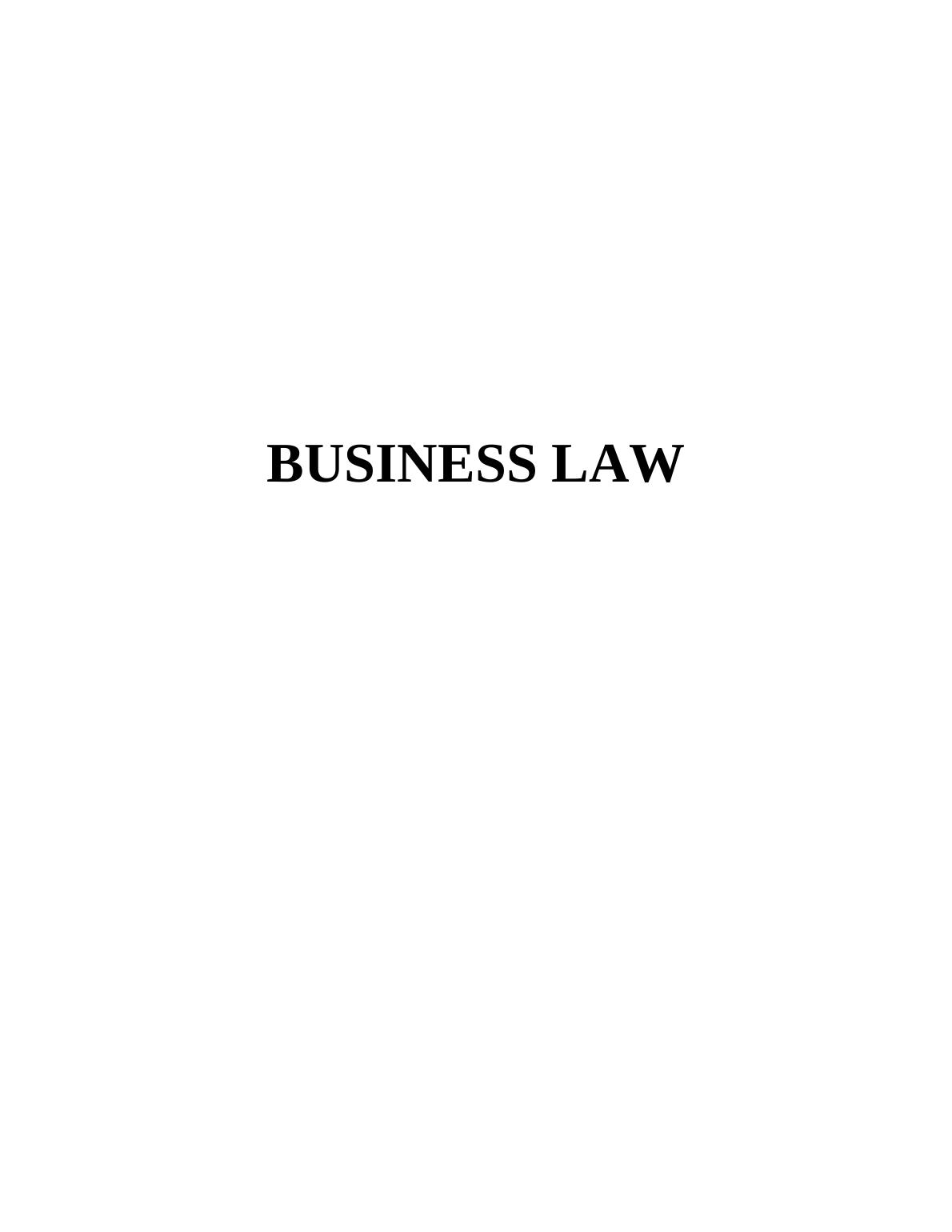
TABLE OF CONTENTSINTRODUCTION...........................................................................................................................1TASK 1............................................................................................................................................11.1 Legal rules on implied terms regarding sale of goods and supply of services......................11.2 Statutory provisions on transfer of property and possession................................................21.3 Statuary provisions on buyer's and seller's remedies............................................................21.4 Product liability statutory provisions related to hair straightener case.................................32.2 Rules, termination rights and default given in scenario........................................................4TASK 2............................................................................................................................................52.1 Different types of credit agreements.....................................................................................52.3 Comparison of different types of agents...............................................................................62.4 Rights and duties of agent.....................................................................................................73.1 Monopolies and anti-competitive practices legislation in UK..............................................73.2 Roles of competition commission within monopolies and anti-competitive practices.........83.3 Various dominant positions within EU exemption to potentially anti-competitive office ofFair Trading.................................................................................................................................83.4 Application of EU exemptions to anti-competitive practices..............................................94.1 Differing forms of intellectual property................................................................................94.4 Comparison and contrast of protection of trademark and business names.........................10TASK 3..........................................................................................................................................104.2 Principles relating to protection of inventions through patent rights and their infringement...................................................................................................................................................104.3 Copyright protection principles and their infringement in given scenario.........................11CONCLUSION..............................................................................................................................12REFERENCE.................................................................................................................................13
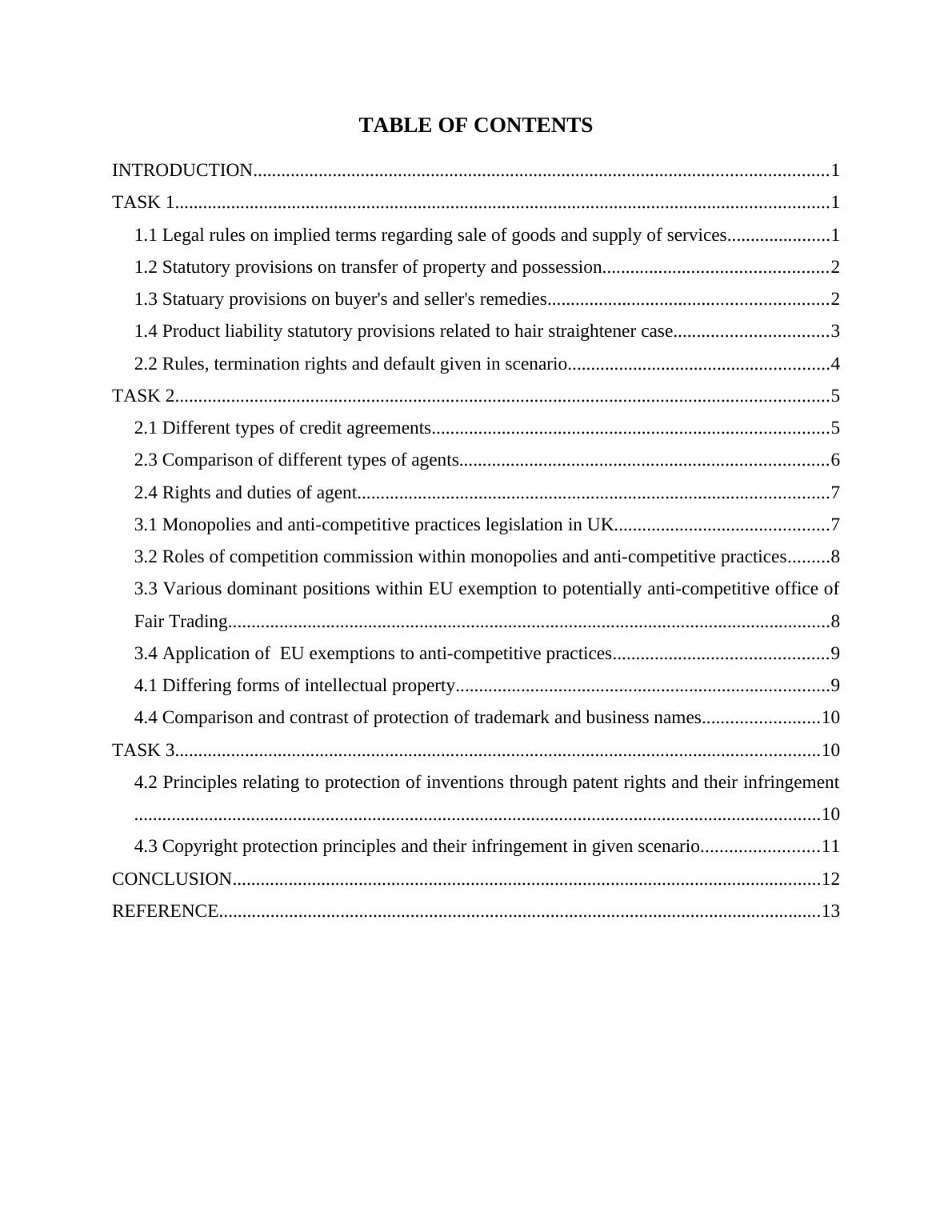
INTRODUCTIONBusiness law is composition of different rules, regulations and policies made bygovernment to start up, manage and closing up any entity. It includes to following rules forpurchasing and selling property or goods. The present report is based on understanding differentcase scenarios and related to business property for buying and selling goods. However, legalrules for applying transfer of property and possession is to described. Including this, comparisonbetween different kinds of credit agreements as agents can be understood (Wang, 2014).Moreover, rights and duties of agent including deep knowledge regarding competitioncommission within monopolies and anti-competitive practices is to expressed. In addition to this,differing forms of intellectual protection and principles related to protection of inventionsthrough patent rights is to be explained. Apart from this, principles regarding copyrightprotection and difference between protection of trademarks and business names is to identified.Thus, by studying this report, learners are able to understand business laws and its several termsto carrying on entity effectively.TASK 11.1 Legal rules on implied terms regarding sale of goods and supply of servicesImplied terms present compulsory rules for every business entity to be followed foroperating activities. In this regard, it aims to supplying a contractual agreements for dealing withother entities and customers. However, there are some legal rules for selling goods and supply ofservices. As per the given case scenario, it is recognized that in 1st case, Mrs Smith wants to buyhair dryer and contracting with dealer but equipment got damaged before reaching out it to MrsSmith, still dealer deliver the product. In addition to this, implied terms to related to providingrules and policies related to transacting goods. There are some guaranties, warranties and somelegal regulations are obtained for business operations (Lyons, 2013). Therefore, organizationsrequire to follow on all obligations. In case of damaging goods, defaulter has to pay fine as perterms. Further, implied terms are interrelated with providing rules and regulations for producingand supplementing goods. Similarly, legal rules are needed to be followed for effectiveproduction and distribution of products. Under this system, defaulter party is needed to pay fineto innocent in case of fraud. Legal rules regarding selling goods and supplying services are applied in implied termsof contract. In this case, there is no liability of seller after selling the product as it is buyers'1
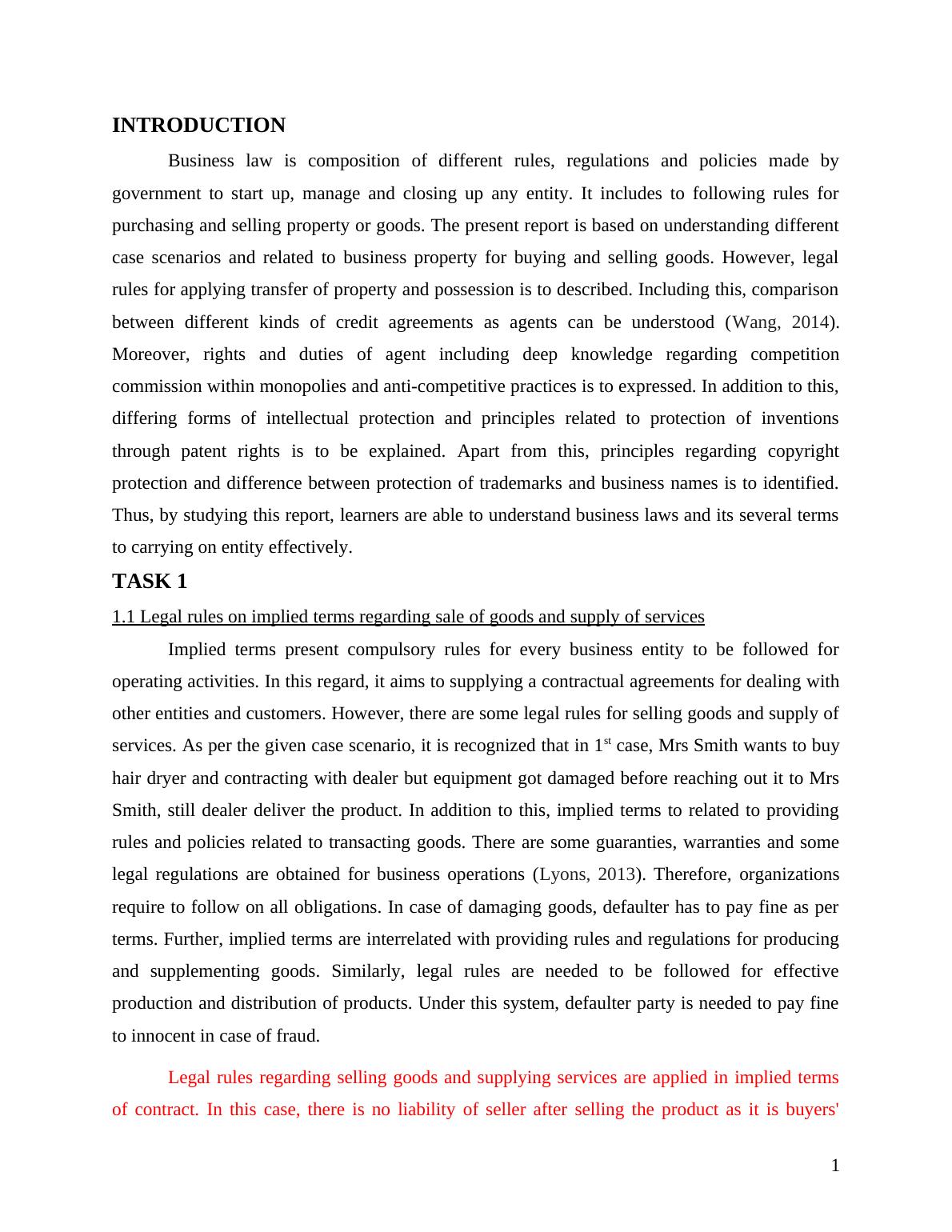
responsibility to looking the goods and entering into agreement carefully. In this regard, as pergiven case scenario, it is Mrs. Smith responsibility to checking out hair dryer before payment andpurchasing the product (Katsos and Forrer, 2014). Therefore, through implied terms of anycontract, there is no liability of seller to pay fine after selling the goods in case of damaging.Thus, for selling goods and supplying services, seller is not liable to refund on default products. Legal rules on implied terms regarding sale of goods and supply of services canunderstand through following rules and regulations of Section 12 as:Section (12): When seller sales the goods, then property and possession over things also get passed.Before entering into the contract, goods are free to sold out and exchanging itsownership.Section (13):Selling goods in sample should be with presenting its description related to qualityfeatures of goods.Only description is not enough, there is requirement to concise of the stated presentation.Section (14):It is required to satisfy quality of goods with its presented descriptions.There should not be any defects in goods which are to sold out (Katsos and Forrer, 2014).All legal systems are implemented in the country for protecting frauds and providing rights tofavourable party. In this regard, it is able for effective business operations as selling andpurchasing items for its effectiveness. Therefore, legal systems are efficient for effectivebusiness operations and reducing frauds.1.2 Statutory provisions on transfer of property and possessionRules of legal policy for related to transformation and possession of goods are followedon that provides information and different cases. In this regard, statutory provisions are related toproviding more information about business operations and protecting customers from damage.Under statutory provision, it is stated that in case of damage, owner is liable to pay fine as perterms and conditions. However, different kinds of information and regulations are obtained to2
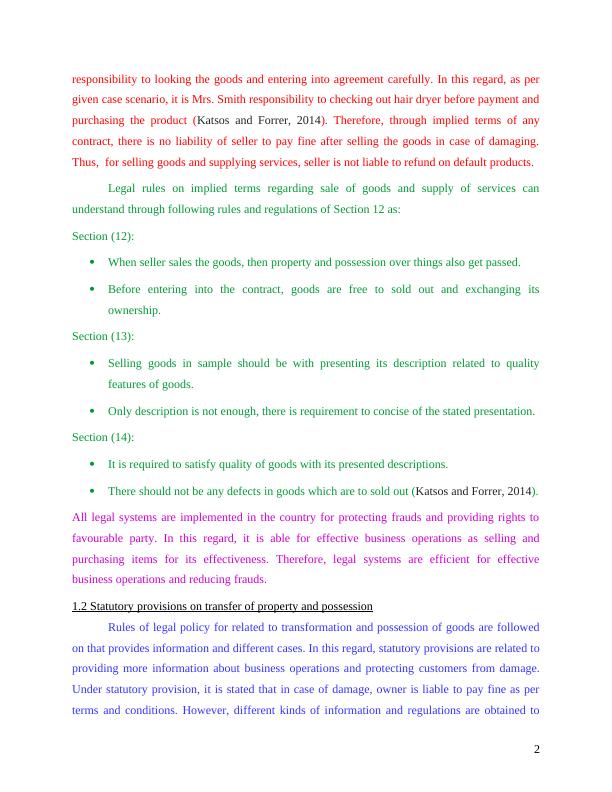
present possession on goods as well exchanging products and services are expressed (Katsos, andForrer, 2014). As per given case scenario, in 1st case, dealer deliver the equipment even it isdamaged during supplying therefore, it is responsibility of owner to pay the fine. Including this,in case 2nd, during delivering carpet, it has stolen and further Alf & Sons refused to refund then itis legally obliged for dealer to return fund. Furthermore, in case 3rd, after purchasing hairstraightener and it got damaged after first day of use by catching fire. Therefore, in this situation,according to law and its provision, it is liability to pay fine (Bekkers, Duysters and Verspagen,2002). However, under case 4th, Peter buys car and paid 6500 as well monthly installments is 200for 2 years. Due to some reasons, he lost his job and further makes plan to stop paying andpresenting his cause. Therefore, in this case, it is legal liability of Peter to pay fund by funding.Hence, statutory provisions provide rules and obligations regarding business prospective and fairdecisions in case of damaging goods. In accordance to this, entity and customer require to followon rules and obligations of legal fundamentals.Section (18): Under section 18 of the transfer of property and ownership, followingprovisions and legislation are provided that can express as:After selling goods, transfer of ownership also get exchanged with the property. Further,it remains buyer's liability to reduce defects occur in goods.Section (19):An agreement created between two parties for exchanging goods and services. However,loss is faced by the party which has ownership of product (Lyons, 2013).Section (20):There is an unconditional contract obtained between two parties for exchanging goods atits deliverable stage. Therefore, before purchasing the products, it is buyer's liability tocheck out the product carefully.Government in law making: Government of the country plays crucial role in law making andcountry's effectiveness to protection from frauds and providing rights to an individual. However,it is considered that laws are considered as valid after government'sapproval on which areimplemented for effective business operations and right of an individual.3
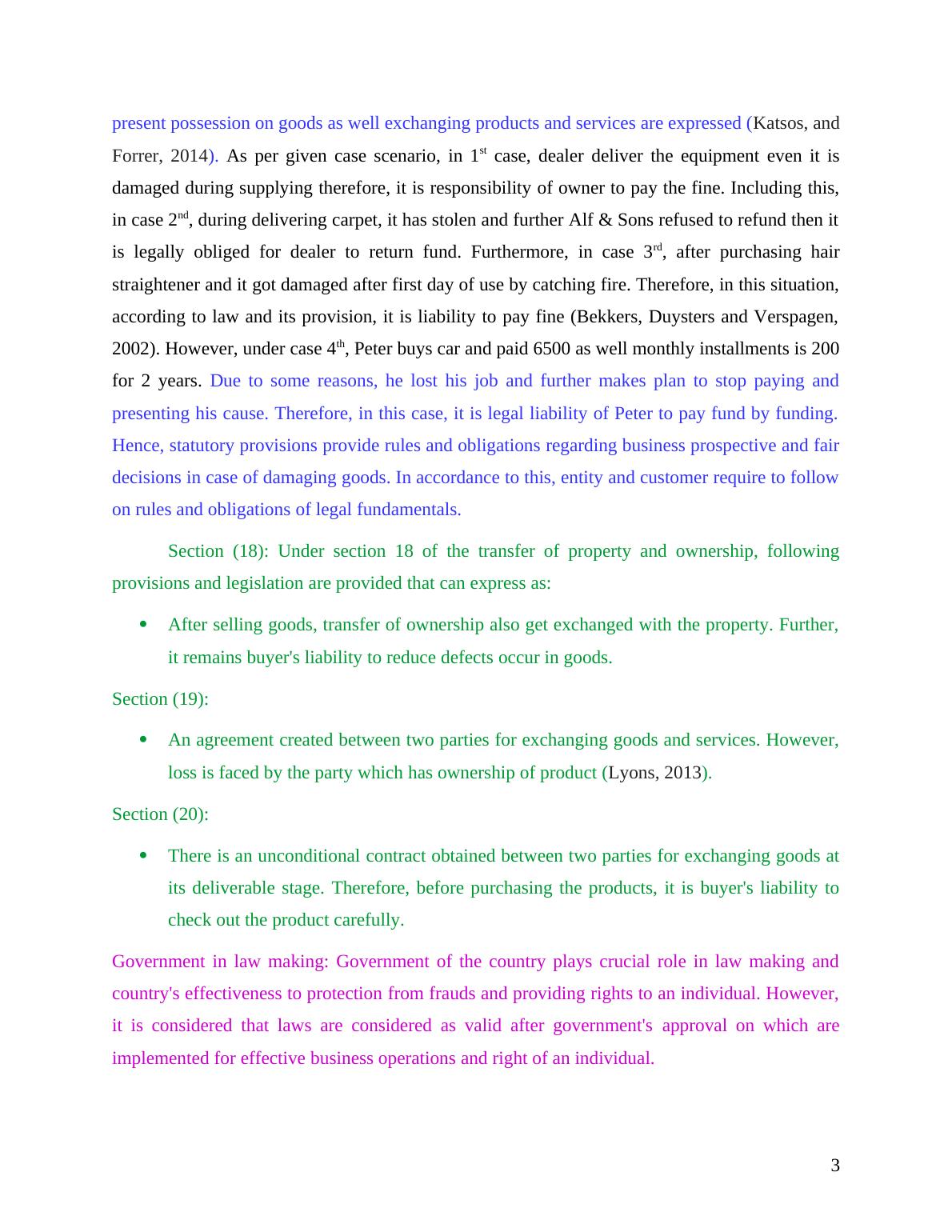
1.3 Statuary provisions on buyer's and seller's remediesThere are some statutory provisions made for contracting two parties as sellers andbuyers. In case of breach the contract for party, rules for defaulter and innocent party is obliged.However, statutory provisions for both parties can be understood as:-For buyers:- Under section 27, it is duty of buyer to accept delivery of goods indetermined time as well variation or defect in goods is able to rejection of goods. In this regard,in case of damage goods, buyer can sue on dealer for fraud same as returning decided money isalso legal obligation for customer for purchasing goods. In addition to this, buyer is free topurchase goods in installment as per company's installment. According to cases, for gettingdefect in hair dryer and straightener and getting damaged, it is legal responsibility for dealer topay for fraud. Thus, in case of breaching the contract, buyer may also has to pay the fine as perterms and conditions (Lyons, 2013).Buyers' have remedies in following cases to cover the contract as:Damages for non-delivery: Under section 57, it is mentioned that if product which gongto deliver and got damaged. In this case, purchaser has right to inquire the seller forexchanging goods or refund (if payment has done).Remedy for breach the warranty: If there is warranty on goods for 1 or 2 years butproduct got damaged then seller is liable to pay fine on it. Therefore, in case of breach thewarrant against consuming the purchased thing buyer has right to inquire the seller andtake remedy on it (Lyons, 2013).Specific performance: Under section 58, there is provision on special performance andcontracting on sold goods. Further, in case of defaults in product, seller is liable to payfine on not performing as stated during contracting between two parties.For sellers:-Statutory provisions are also made to understand liabilities of seller forselling or transacting goods. However, for providing damaged goods, seller is liable to pay fineas well acting his accepting (Bekkers, Duysters and Verspagen, 2002). In addition to this, incase of fraud, buyer can claim on seller for not following on terms and conditions. Moreover, itis duty of seller to well behaved with customers and presenting loyal things in front of them.4
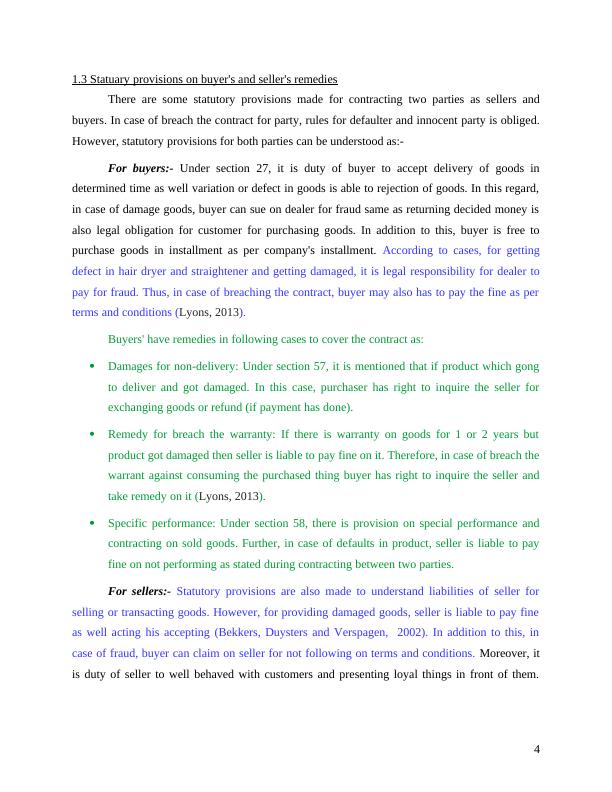
End of preview
Want to access all the pages? Upload your documents or become a member.
Related Documents
Analyse and advice on statutory provisions in business lawlg...
|17
|6159
|291
Business law INTRODUCTION 3 Task 13 1.1 Analysis and applicability of statutory provisions concerning implied terms in sales of goods and supply of serviceslg...
|16
|5393
|252
Analysis of Business Law Doclg...
|15
|4603
|31
Rules and Regulations Adopted by Businesslg...
|14
|5495
|33
BUSINESS LAWS University BUSINESS LAWS By Date Name Lecturer's Namelg...
|20
|5387
|115
Case Study on Business Law - Doclg...
|17
|5191
|33
